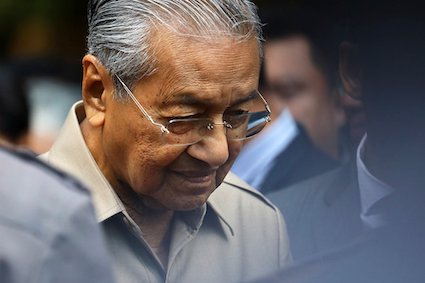Dr M’s motion against Muhyiddin won’t see light of day

(FMT) – The motion of no confidence proposed by Dr Mahathir Mohamad against Muhyiddin Yassin when the Dewan Rakyat sits on May 18 is unlikely to see the light of day, going by parliamentary rules and conventions.
Between the motion and the 222 MPs are the Standing Orders of the Dewan Rakyat, which make it clear that government business takes precedence over all others, including private members’ bills and motions.
“Government business shall be set down in such order as the government thinks fit and communicates to the setiausaha,” reads Standing Order 15(2).
This is exactly what two lawyers familiar with parliamentary proceedings say will happen during the one-day sitting on May 18.
They said speaker Mohamad Ariff Md Yusof may or may not allow the motion to be debated.
Earlier today, Ariff accepted the motion by the Langkawi MP, after rejecting three others for not following parliamentary rules.
But lawyer N Surendran, a former MP from PKR, said Ariff’s decision was because it conformed to parliamentary rules and therefore not rejected due to failure to comply with the standing orders.
“It does not automatically mean that the motion will be debated in the house and that a vote will be taken,” the former Padang Serai MP told FMT.
He said government business often takes priority over matters such as motions by other MPs.
He added that the no-confidence motion would probably appear on the order paper, but might be relegated and not debated at all.
The order paper shows questions, motions, business, notices of committees, announcements and lists of future parliamentary business.
Surendran said Pakatan Harapan (PH) politicians had only themselves to blame for not changing the rules when the coalition was in power.
“When they were in power, they failed to institute critical reforms in the Dewan Rakyat.”
He said this was unlike in the UK, where opposition motions are easily debated.
“These reforms did not happen when PH had the opportunity to carry them out,” he said.
Lawyer Andrew Khoo agreed that there was little or no chance of the motion being debated.
“The government will try to insist that only government business will be prioritised, and the Dewan Rakyat will only sit for one day.
“But the Dewan is presided over by the speaker and he has a certain amount of discretion in conducting the proceedings. His rulings will determine the proceedings, as long as he complies with the standing orders,” Khoo, who co-chairs the Bar Council’s constitutional law committee, told FMT.
Former law professor Gurdial Singh Nijar said while government matters were discussed first by convention, the speaker may also allow emergency motions to be debated on matters of public interest.
He said the speaker may then hold a special chamber comprising all MPs to consider an urgent motion.
“Say, if we are being attacked by somebody, a member can stand up and propose an urgent motion. You can’t tell that person to hold it off to the ‘next session’. Yes, government matters precede other matters but if it is a matter of public importance, then it can be brought forth by the speaker,” he told FMT.
Gurdial said this is provided for under Standing Order No. 18 (1) of the Parliament, which reads: “Any member other than a minister may rise in his place and ask leave to discuss a defined matter of urgent public importance by reading the text of the motion approved by Tuan Yang di-Pertua.”

